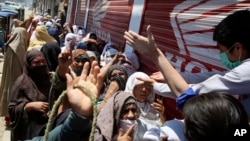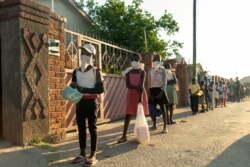The United Nations is boosting its appeal for coronavirus aid by billions of dollars, saying more money is necessary to protect millions of lives and help stop the spread of the infection in fragile countries.
"We have made a good start, now we must build on it," U.N. Secretary-General Antonio Guterres said Thursday in a video message about the more than $1 billion his initial March 25 appeal for $2 billion has brought in. "We need $6.7 billion to protect millions of people and help stop the virus from circling back around the globe."
The U.N. has repeatedly warned that if COVID-19, the disease caused by the coronavirus, wreaks havoc in the poorest places, the entire planet will remain at risk.
U.N. humanitarian chief Mark Lowcock, in a virtual launch of the appeal, said while many developing countries are not expected to experience the peak of COVID-19 cases for another three to six months, they are already being negatively impacted with lost jobs and income, tighter food supplies and children going without vaccinations.
"In many places the impact of national measures to contain the spread of the virus and the global recession may be larger than the direct impact of the disease," he warned Thursday.
"What we are facing now is a double pandemic of truly — famines that could impact us at biblical proportions," said the head of the World Food Program David Beasley.
He warned without action now, the fallout from COVID-19 could cost the world "100-fold more."
The expanded appeal seeks to assist more than 60 high-risk countries, including Benin, Djibouti, Liberia, Mozambique, Pakistan, the Philippines, Sierra Leone, Togo and Zimbabwe.
The Africa Centres for Disease Control and Prevention has confirmed more than 50,000 cases on the continent, with South Africa and Egypt the hardest hit.
Funds raised by the appeal will go toward supporting immediate humanitarian needs related to COVID-19, as well as health needs and vital logistics — including an air bridge to transport personal protection equipment, field hospitals and other crucial COVID-19 response items.
Risks of reopening
A number of countries are starting to lift strict lockdown restrictions put in place to stop the spread of the virus, as officials express optimism that the worst has passed in their nations.
Health experts are warning of the potential for a resurgence of infections if the restrictions are lifted too quickly.
"We're risking a backslide that will be intolerable," said Dr. Ian Lipkin of Columbia University in New York.
Governments in Europe and individual U.S. states are among those currently starting to allow certain businesses to reopen, and people to start going to restaurants and shops as long as they follow social distancing guidelines. Health officials have expressed concern the public will see those moves as a sign that the threat of the virus is gone.
"If we relax these measures without having the proper public health safeguards in place, we can expect many more cases and, unfortunately, more deaths," said Josh Michaud, associate director of global health policy at the Kaiser Family Foundation in Washington.
South Korea is taking new steps as the number of new infections there remains at around zero. Its largest airline said Thursday it would resume flights to the United States, Europe and other parts of Asia next month.
The South Korean government is also expanding shipments of masks to other countries, with a focus on those with an urgent need amid larger outbreaks of COVID-19.
In Brazil, the health ministry reported a record rise of 10,500 new confirmed cases, pushing the country's total above 126,600.
Spain, which a month ago was reporting 900 deaths per day as it dealt with one of the world's worst outbreaks, said Thursday its daily death toll had dropped to 213.
There are about 3.8 million confirmed coronavirus cases worldwide, with 264,000 deaths.
The head of the World Health Organization's Europe office expressed concern Thursday about the rise in domestic violence cases during the pandemic, calling the development deeply troubling. Dr. Hans Kluge noted reports of violence against women and children in Belgium, Britain, France, Russia and Spain.






